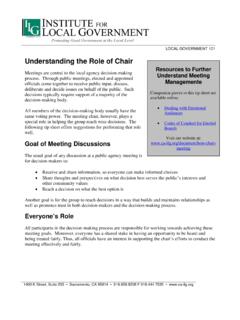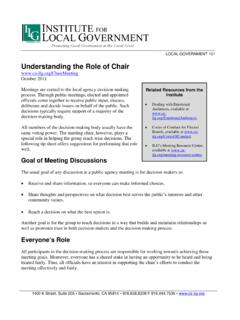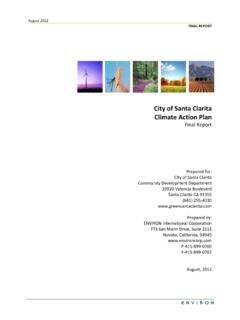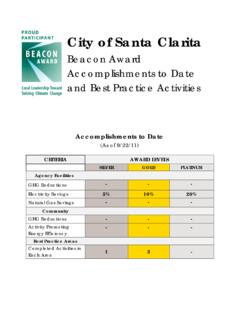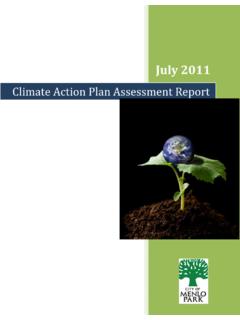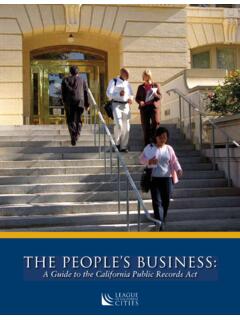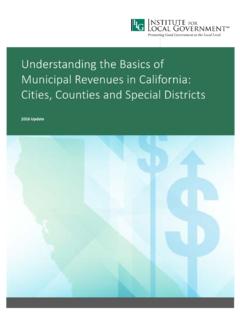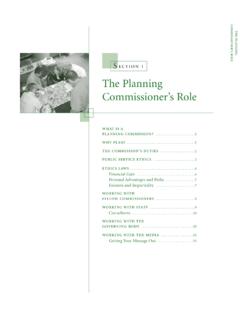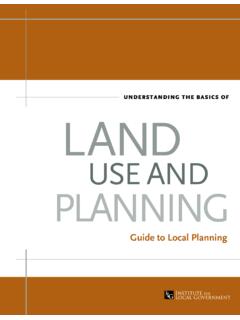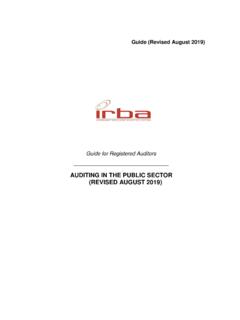Transcription of THE ROLE OF AUDITING IN PUBLIC SECTOR GOVERNANCE
1 THE INSTITUTE OF INTERNAL AUDITORS247 Maitland Springs, FL 32701-4201 ROLE OF AUDITING INPUBLIC SECTOR GOVERNANCE06000 The Institue of Internal Auditors / 1 The Role of AUDITING inPublic SECTOR GovernanceThis practice guide presents information on the importance of the PUBLIC SECTOR audit activityto effective GOVERNANCE and defines the key elements needed to maximize the value the PUBLIC SECTOR audit activity provides to all levels of government. The practice guide is intended to point to the roles of audit (without differentiating between external and internal), methods by which those roles can be fulfilled, and the essential ingredients necessary to support an effective audit function. As such, it may not be fully applicable in every jurisdiction, particularly where government audit roles and responsibilities are specifically defined to exclude certain functions or assign them to other 20062 The Institue of Internal Auditors / The Institue of Internal Auditors / OF CONTENTSEXECUTIVE SUMMARY.
2 3 Internal and External AUDITING in a Government Context PUBLIC SECTOR GOVERNANCE The Role of Government AUDITING Key Elements of an Effective Government audit ActivityPUBLIC SECTOR GOVERNANCE .. 6 Principles of GOVERNANCE GOVERNANCE Principles Critical to the PUBLIC SECTOR AccountabilityPUBLIC SECTOR AUDITING .. 10 Definitions and Origins of AUDITING audit Roles Reporting Line of Government Auditors Types of Audits and Other ServicesCONCLUSION .. 19 APPENDIX audit COMMITTEES IN THE PUBLIC SECTOR ..20 The audit Committee s Role audit Committtee Best PracticesENDORSING ORGANIZATIONS .. 22 The Institue of Internal Auditors / 3 The Institue of Internal Auditors / 3 EXECUTIVE SUMMARYThis paperpresents our position on the importance of the PUBLIC SECTOR audit activity to effective GOVERNANCE and defines the key elements needed to maximize the value the PUBLIC SECTOR audit activity provides to all levels of government.
3 The principles we discuss are relevant to national, regional ( , state or provincial), and local ( , county, city, or village) governments, as well as quasi-governmental and international government organizations. They also may apply to other publicly funded entities. This guide is addressed primarily to elected and appointed government officials, as well as advocates of good government everywhere. Its purpose is to encourage readers to reflect on the government audit activities that now serve their jurisdictions and evaluate how those audit activities can be supported to most effectively fulfill their highest role in the GOVERNANCE of PUBLIC SECTOR institutions. In those jurisdictions where a government audit activity is needed, this paper can provide the initial guidance for decision-makers on the outcomes and services they should expect and the elements that are needed to establish an effective audit guidance on the standards, model legislation, and other tools for creating and improving government audit services are available from any of the endorsing organizations.
4 INTERNAL AND EXTERNAL AUDITING IN A GOVERNMENT CONTEXTThis paper addresses the role of government AUDITING , including both internal and external government AUDITING . A myriad of government audit activities and reporting relationships exist among different jurisdictions and in different forms of government. The key point, however, is that government audit activities must be configured appropriately to enable governments and government entities to fulfill their duty to be accountable to the citizens, while achieving their objectives effectively, efficiently, and ethically. PUBLIC SECTOR GOVERNANCEP ublic SECTOR GOVERNANCE encompasses the policies and procedures used to direct an organization s activities to provide reasonable assurance that objectives are met and that operations are carried out in an ethical and accountable manner.
5 In the PUBLIC SECTOR , GOVERNANCE relates to the means by which goals are established and accomplished. It also includes activities that ensure a government s credibility, establish equitable provision of services, and assure appropriate behavior of government officials reducing the risk of PUBLIC corruption. THE ROLE OF GOVERNMENT AUDITINGG overnment AUDITING is a cornerstone of good PUBLIC SECTOR GOVERNANCE . By providing unbiased, objective assessments of whether PUBLIC resources are responsibly and effectively managed to achieve intended results, auditors help government organizations achieve accountability and integrity, improve operations, and instill confidence among citizens and stakeholders. The government auditor s role supports the GOVERNANCE responsibilities of oversight, insight, and foresight. Oversight addresses whether government entities are doing what they are supposed to Oversight addresses whether government entities are doing what they are supposed to Oversightdo and serves to detect and deter PUBLIC corruption.
6 Insight assists decision-makers by providing Insight assists decision-makers by providing Insightan independent assessment of government programs, policies, operations, and results. Foresight identifies trends and emerging challenges. Auditors use tools such as financial audits, performance audits, and investigation and advisory services to fulfill each of these roles. 4 The Institue of Internal Auditors / The Institue of Internal Auditors / ELEMENTS OF AN EFFECTIVE PUBLIC SECTOR audit ACTIVITYAn effective PUBLIC SECTOR audit activity strengthens GOVERNANCE by materially increasing citizens ability to hold their government perform an especially important function in those aspects of GOVERNANCE that are crucial in the PUBLIC SECTOR for promoting credibility, equity, and appropriate behavior of government officials, while reducing the risk of PUBLIC corruption.
7 Therefore, it is crucial that government audit activities are configured appropriately and have a broad mandate to achieve these objectives. The audit activity must be empowered to act with integrity and produce reliable services, although the specific means by which auditors achieve these goals vary. At a minimum, government audit activities need: Organizational independence allows the audit activity to conduct work without interference by the entity under audit . The audit activity should have sufficient independence from those it is required to audit so that it can both conduct its work without interference and be seen to be able to do so. Coupled with objectivity, organizational independence contributes to accuracy of the auditors work and the ability to rely on the results and report. Given the variety of forms of government AUDITING , it is difficult here to specify one reporting line.
8 Greater guidance is provided in professional standards. A formal audit activity s powers and duties should be established by the government s constitution , charter, or other basic legal document. Among other topics, this document would address procedures and requirements of reporting, the obligation of the audited entity to collaborate with the auditor. Unrestricted access. Audits should be conducted with complete and unrestricted access to employees, property, and records. Sufficient funding. The audit activity must have sufficient funding relative to the size of its audit responsibilities. This important element should not be left under the control of the organization under audit because the budget impacts the audit activity s capacity to carry out its duties. Competent leadership. The head of the audit activity must be able to effectively recruit, retain, and manage highly skilled staff.
9 Moreover, the chief audit executive should be an articulate PUBLIC spokesperson for the audit activity. Competent staff The audit activity needs a professional staff that collectively has the necessary qualifications and competence to conduct the full range of audits required by its mandate . Auditors must comply with minimum continuing education requirements established by their relevant professional organizations and standards. Stakeholder support. The legitimacy of the audit activity and its mission should be understood and supported by a broad range of elected and appointed government officials, as well as the media and involved citizens. Professional audit standards. Professional audit standards support the implementation of the previous elements and provide a framework to promote quality audit work that is systematic, objective, and based on evidence.
10 Just as many governments have adopted internal control standards either as requirements or guidance for PUBLIC SECTOR managers audit activities should conduct their work in accordance with recognized SUMMARYThe Institue of Internal Auditors / 5 The Institue of Internal Auditors / 5 The discussion on the following pages details key PUBLIC SECTOR GOVERNANCE principles and describes the services and contributions that governments can derive from their audit activities. We invite readers to consider these elements in evaluating current or planned audit activities, to determine if they are positioned to achieve their objectives of PUBLIC accountability and service SUMMARYKEY POINTSRECOMMENDATIONSTo protect the PUBLIC interest, every government requires independent audit activities provid-ing a range of assurance and advisory services from financial attestation to performance and operational efficiency whether through the use of internal or external audit services, or a combination of the two.
